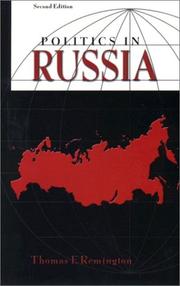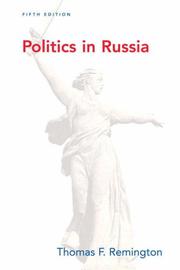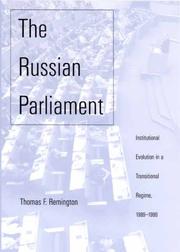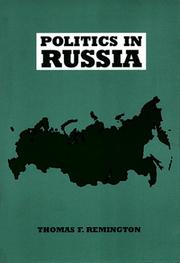| Listing 1 - 10 of 18 | << page >> |
Sort by
|

ISBN: 0321085574 9780321085573 Year: 2002 Publisher: New York: Longman,
Abstract | Keywords | Export | Availability | Bookmark
 Loading...
Loading...Choose an application
- Reference Manager
- EndNote
- RefWorks (Direct export to RefWorks)
Russia (Federation) --- Soviet Union --- Russie --- URSS --- Politics and government --- Politics and government. --- Politique et gouvernement --- Post-communism --- Constitutional history --- -l#SBIB:328H262 --- Constitutional history, Modern --- Constitutional law --- Constitutions --- History --- Instellingen en beleid: Rusland en het GOS --- -Soviet Union --- -Politics and government --- l#SBIB:328H262 --- Post-communism - Russia (Federation) --- Constitutional history - Russia (Federation) --- Soviet Union - Politics and government. --- Russia (Federation) - Politics and government - 1991 --- -Russia (Federation) --- -Constitutional history
Book
ISBN: 9781107096417 9781107422247 9780511973024 1107096413 1107422248 Year: 2011 Publisher: Cambridge: Cambridge university press,
Abstract | Keywords | Export | Availability | Bookmark
 Loading...
Loading...Choose an application
- Reference Manager
- EndNote
- RefWorks (Direct export to RefWorks)
"This book investigates the relationship between the character of political regimes in Russia's subnational regions and the structure of earnings and income. Based on extensive data from Russian official sources and surveys conducted by the World Bank, the book shows that income inequality is higher in more pluralistic regions. It argues that the relationship between firms and government differs between more democratic and more authoritarian regional regimes. In more democratic regions, business firms and government have more cooperative relations, restraining the power of government over business and encouraging business to invest more, pay more, and report more of their wages. Average wages are higher in more democratic regions and poverty is lower, but wage and income inequality are also higher. The book argues that the rising inequality in postcommunist Russia reflects the inability of a weak state to carry out a redistributive social policy"--
Income --- Income distribution --- Poverty --- Wealth --- Equality --- Democracy --- RU / Russia - Rusland - Russie --- 202 --- 313 --- 339.21 --- Sociale organisatie. --- Levenswijze en levensstandaard. Levensminimum. sociale indicatoren (Studiën). --- Ongelijkheid en herverdeling van vermogens en inkomens. Inkomensbeleid. --- Affluence --- Distribution of wealth --- Fortunes --- Riches --- Business --- Economics --- Finance --- Capital --- Money --- Property --- Well-being --- Family income --- Household income --- Personal income --- Gross national product --- Profit --- Purchasing power --- Distribution of income --- Income inequality --- Inequality of income --- Distribution (Economic theory) --- Disposable income --- Egalitarianism --- Inequality --- Social equality --- Social inequality --- Political science --- Sociology --- Liberty --- Self-government --- Representative government and representation --- Republics --- Sociale organisatie --- Levenswijze en levensstandaard. Levensminimum. sociale indicatoren (Studiën) --- Ongelijkheid en herverdeling van vermogens en inkomens. Inkomensbeleid --- Income - Russia (Federation) --- Income distribution - Russia (Federation) --- Poverty - Russia (Federation) --- Wealth - Russia (Federation) --- Equality - Russia (Federation) --- Democracy - Russia (Federation)

ISBN: 9780205586028 Year: 2008 Publisher: New York : Pearson/Longman,
Abstract | Keywords | Export | Availability | Bookmark
 Loading...
Loading...Choose an application
- Reference Manager
- EndNote
- RefWorks (Direct export to RefWorks)
Book
ISBN: 1107096413 1107422248 1139076701 9786613193247 113908352X 1139070983 0511973020 1283193248 1139078984 113908125X 1139064185 1107222419 9781139078986 9780511973024 6613193240 9781139081252 9781107096417 9781107422247 9781139064187 9781107222410 9781283193245 9781139076708 9781139070980 Year: 2011 Publisher: Cambridge : Cambridge University Press,
Abstract | Keywords | Export | Availability | Bookmark
 Loading...
Loading...Choose an application
- Reference Manager
- EndNote
- RefWorks (Direct export to RefWorks)
This book investigates the relationship between the character of political regimes in Russia's subnational regions and the structure of earnings and income. Based on extensive data from Russian official sources and surveys conducted by the World Bank, the book shows that income inequality is higher in more pluralistic regions. It argues that the relationship between firms and government differs between more democratic and more authoritarian regional regimes. In more democratic regions, business firms and government have more cooperative relations, restraining the power of government over business and encouraging business to invest more, pay more and report more of their wages. Average wages are higher in more democratic regions and poverty is lower, but wage and income inequality are also higher. The book argues that the rising inequality in postcommunist Russia reflects the inability of a weak state to carry out a redistributive social policy.
Social Sciences --- Political Science --- Income --- Income distribution --- Poverty --- Wealth --- Equality --- Democracy --- Self-government --- Political science --- Representative government and representation --- Republics --- Egalitarianism --- Inequality --- Social equality --- Social inequality --- Sociology --- Liberty --- Affluence --- Distribution of wealth --- Fortunes --- Riches --- Business --- Economics --- Finance --- Capital --- Money --- Property --- Well-being --- Distribution of income --- Income inequality --- Inequality of income --- Distribution (Economic theory) --- Disposable income --- Family income --- Household income --- Personal income --- Gross national product --- Profit --- Purchasing power

ISBN: 0300084986 0300129769 9780300129762 9780300084986 128173053X 9781281730534 9786611730536 Year: 2001 Publisher: New Haven : Yale University Press,
Abstract | Keywords | Export | Availability | Bookmark
 Loading...
Loading...Choose an application
- Reference Manager
- EndNote
- RefWorks (Direct export to RefWorks)
From the first free elections in post-Soviet Russia in 1989 to the end of the Yeltsin period in 1999, Russia's parliament was the site of great political upheavals. Conflicts between communists and reformers generated constant turmoil, and twice parliamentary institutions broke down in violence. This book offers the first full account of the inaugural decade of Russia's parliament. Thomas F. Remington, a leading scholar of Russian politics, describes in unique detail the Gorbachev-era parliament of 1989-91, the interim parliament of 1990-93, and the current Federal Assembly.Focusing particularly on the emergence of parliamentary parties and bicameralism, Remington explores how the organization of the Russian parliament changed, why some changes failed while others were accepted, and why the current parliament is more effective and viable than its predecessors. He links the story of parliamentary evolution in Russia to contemporary theories of institutional development and concludes that, notwithstanding the turbulence of Russia's first postcommunist decade, parliament has served as a stabilizing influence in Russian political life.
Representative government and representation --- #SBIB:324H40 --- #SBIB:328H262 --- Politieke structuren: algemeen --- Instellingen en beleid: Rusland en het GOS --- Russia (Federation). --- Gosduma (Russia : 1993- ) --- Russian State Duma (Russia : 1993- ) --- Duma (Russia : 1993- ) --- Gosudarstvennai︠a︡ Duma Rossiĭskoĭ Federat︠s︡ii --- Gosduma FS RF
Book
ISBN: 1139905015 1139914723 1139899082 1139903047 1139629352 1139910795 1139906933 1139918648 113992253X 9781139910798 9781139922531 9781139629355 9781107040793 1107040795 9781107627635 110762763X Year: 2014 Publisher: Cambridge : Cambridge University Press,
Abstract | Keywords | Export | Availability | Bookmark
 Loading...
Loading...Choose an application
- Reference Manager
- EndNote
- RefWorks (Direct export to RefWorks)
The book examines the way Russian presidents Yeltsin, Medvedev, and Putin have used their constitutional decree powers since the end of the Soviet regime. The Russian constitution gives the Russian president extremely broad decree-making power, but its exercise is constrained by both formal and informal considerations. The book compares the Russian president's powers to those of other presidents, including the executive powers of the United States president and those of Latin American presidents. The book traces the historical development of decree power in Russia from the first constitution in 1905 through the Soviet period and up to the present day, showing strong continuities over time. It concludes that Russia's president operates in a strategic environment, where he must anticipate the way other actors, such as the bureaucracy and the parliament, will respond to his use of decree power.
Executive power --- Presidents --- Presidency --- Heads of state --- Emergency powers --- Power, Executive --- Political science --- Implied powers (Constitutional law) --- Separation of powers --- Powers
Book
ISBN: 0197685994 0197685986 0197685978 Year: 2023 Publisher: New York, NY : Oxford University Press,
Abstract | Keywords | Export | Availability | Bookmark
 Loading...
Loading...Choose an application
- Reference Manager
- EndNote
- RefWorks (Direct export to RefWorks)
Since the economic liberalization wave that began in the late 1970s, inequality around the world has skyrocketed. In this book, Thomas F. Remington examines the rise of extreme economic inequality in the United States since the late 1970s by drawing comparisons to the effects of market reforms in transition countries such as Russia, China, and Germany.
Política económica --- Estados Unidos --- Desigualdad Social --- Planificación económica --- Economía --- EEUU --- EE.UU. --- E.E.U.U. --- USA --- United States --- U.S. --- U.S.A. --- Equality --- Income distribution --- Egalitarianism --- Inequality --- Social equality --- Social inequality --- Political science --- Sociology --- Democracy --- Liberty --- Power (Social sciences) --- Economics. --- Russia (Federation) --- China --- Economic policy --- Russian Federation --- Rossiyskaya Federatsiya --- Rossiya (Federation) --- Rossii︠a︡ (Federation) --- Российская Федерация --- Rossiĭskai︠a︡ Federat︠s︡ii︠a︡ --- Rosiĭsʹka Federat︠s︡ii︠a︡ --- Російська Федерація --- Federazione della Russia --- Russische Föderation --- RF --- Federation of Russia --- Urysye Federat︠s︡ie --- Pravitelʹstvo Rossii --- Правительство России --- Pravitelʹstvo Rossiĭskoĭ Federat︠s︡ii --- Правительство Российской Федерации --- Правительство РФ --- Pravitelʹstvo RF --- Rosja (Federation) --- Eluosi (Federation) --- O-lo-ssu (Federation) --- 俄罗斯 (Federation) --- Roshia Renpō --- Federazione russa --- OKhU --- Orosyn Kholboony Uls --- Russian S.F.S.R. --- RF (Russian Federation) --- Россия (Federation)

ISBN: 0321004930 Year: 1998 Publisher: New York (N.Y.) : Longman,
Abstract | Keywords | Export | Availability | Bookmark
 Loading...
Loading...Choose an application
- Reference Manager
- EndNote
- RefWorks (Direct export to RefWorks)
Book
ISBN: 9780813326863 Year: 1994 Publisher: Boulder (Colo.) Westview
Abstract | Keywords | Export | Availability | Bookmark
 Loading...
Loading...Choose an application
- Reference Manager
- EndNote
- RefWorks (Direct export to RefWorks)
Book
ISBN: 0813388147 Year: 1994 Publisher: Boulder, Colo. : Westview Press,
Abstract | Keywords | Export | Availability | Bookmark
 Loading...
Loading...Choose an application
- Reference Manager
- EndNote
- RefWorks (Direct export to RefWorks)
Legislative bodies --- Parlements --- Europe, Eastern --- Former Soviet republics --- Europe de l'Est --- Ex-URSS --- Politics and government --- Politique et gouvernement
| Listing 1 - 10 of 18 | << page >> |
Sort by
|

 Search
Search Feedback
Feedback About UniCat
About UniCat  Help
Help News
News